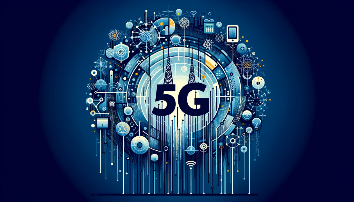
5G technology represents a significant leap in mobile connectivity, offering higher speeds, lower latency, and greater capacity compared to previous generations. This advancement is not merely a technological upgrade; it is a catalyst for transformational changes across various sectors of the economy.
Impact on Different Sectors – Supply Chain and Logistics: 5G’s features, such as low latency and high bandwidth, are expected to accelerate digital transformation in the supply chain industry. This technology will enable real-time data processing and enhance operational efficiency, thereby streamlining logistics and inventory management.





Healthcare:
The healthcare sector stands to benefit immensely from 5G, which can support telemedicine, remote monitoring, and real-time data sharing. This connectivity will facilitate better patient care and operational efficiencies in healthcare facilities.
Manufacturing:
In manufacturing, 5G will drive the adoption of smart factories and automation technologies. The ability to connect numerous devices and sensors will enhance productivity and enable predictive maintenance.
Transportation:
The development of autonomous vehicles and smart transportation systems is heavily reliant on 5G technology. Its low latency and high-speed capabilities will allow for real-time communication between vehicles and infrastructure, improving safety and efficiency.
Smart Cities:
5G will play a crucial role in the development of smart cities, enabling interconnected systems for traffic management, energy distribution, and public safety. This integration will lead to more sustainable urban environments.
Economic Contributions
The economic implications of 5G are profound. It is projected that 5G technology could contribute significantly to GDP growth in various countries. For instance, in India, it is expected to add about US$ 180 billion to the GDP by 2030, with major sectors like energy, retail, and healthcare leading the charge. Similarly, in Nigeria, the deployment of 5G is anticipated to spur innovation and economic growth, particularly among its tech-savvy population.
Conclusion
In summary, 5G technology is not just about faster internet; it is a transformative force that will reshape industries, enhance operational efficiencies, and drive economic growth. As businesses and governments invest in this technology, the potential for innovation and new business models will expand, paving the way for a more connected and efficient future.


Leave a Reply